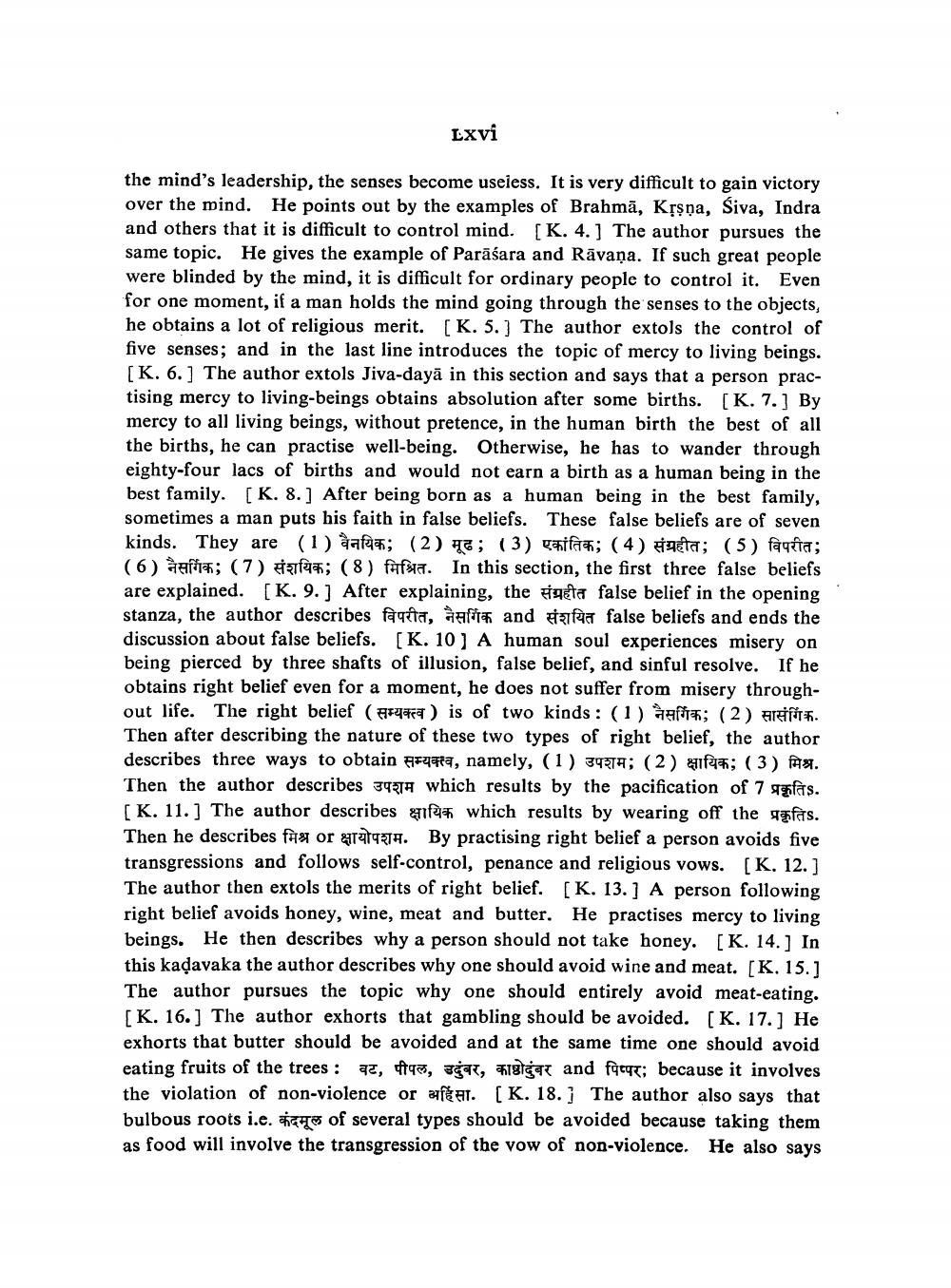________________
LXvi
the mind's leadership, the senses become useless. It is very difficult to gain victory over the mind. He points out by the examples of Brahma, Krsna, Siva, Indra and others that it is difficult to control mind. [K. 4.] The author pursues the same topic. He gives the example of Parāśara and Ravana. If such great people were blinded by the mind, it is difficult for ordinary people to control it. Even for one moment, if a man holds the mind going through the senses to the objects, he obtains a lot of religious merit. [K. 5.] The author extols the control of five senses; and in the last line introduces the topic of mercy to living beings. [K. 6.] The author extols Jiva-daya in this section and says that a person practising mercy to living-beings obtains absolution after some births. [K. 7.] By mercy to all living beings, without pretence, in the human birth the best of all the births, he can practise well-being. Otherwise, he has to wander through eighty-four lacs of births and would not earn a birth as a human being in the best family. [K. 8.] After being born as a human being in the best family, sometimes a man puts his faith in false beliefs. These false beliefs are of seven kinds. They are ( 1 ) वैनयिक; (2) मूढ; ( 3 ) एकांतिक ; ( 4 ) संग्रहीत ; ( 5 ) विपरीत; ( 6 ) नैसर्गिक (7) संशयिक; (8) मिश्रित. In this section, the first three false beliefs are explained. [K. 9.] After explaining, the dufter false belief in the opening stanza, the author describes विपरीत, नैसर्गिक and संशयित false beliefs and ends the discussion about false beliefs. [K. 10] A human soul experiences misery on being pierced by three shafts of illusion, false belief, and sinful resolve. If he obtains right belief even for a moment, he does not suffer from misery throughout life. The right belief (a) is of two kinds: (1) eft; (2) arif. Then after describing the nature of these two types of right belief, the author describes three ways to obtain सम्यकस्य, namely (1) उपशम (2) क्षायिक (3) मिश्र. Then the author describes उपशम which results by the pacification of 7 प्रकृतिs. [K. 11.] The author describes gf which results by wearing off the safes. Then he describes fhs or gra. By practising right belief a person avoids five transgressions and follows self-control, penance and religious vows. [K. 12.] The author then extols the merits of right belief. [K. 13.] A person following right belief avoids honey, wine, meat and butter. He practises mercy to living beings. He then describes why a person should not take honey. [K. 14.] In this kadavaka the author describes why one should avoid wine and meat. [K. 15.] The author pursues the topic why one should entirely avoid meat-eating. [K. 16.] The author exhorts that gambling should be avoided. [K. 17.] He exhorts that butter should be avoided and at the same time one should avoid eating fruits of the trees वट, पीपल, उदुंबर, कान्छोदुंबर and पिप्परः because it involves the violation of non-violence or after. [K. 18.] The author also says that bulbous roots i.e. a of several types should be avoided because taking them as food will involve the transgression of the vow of non-violence. He also says




